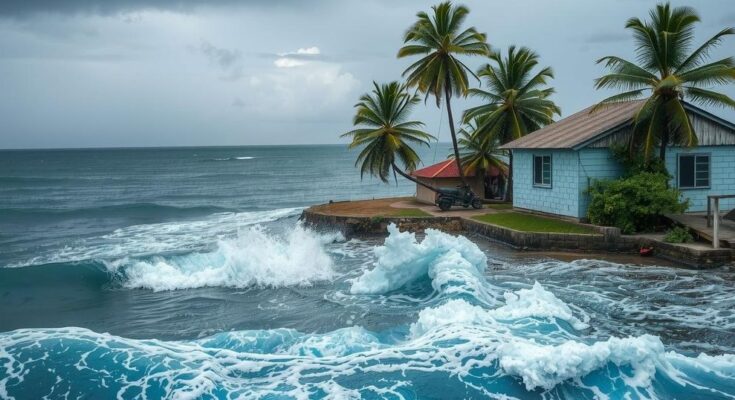Cyclone Chido’s death toll in Mozambique has nearly doubled to 75, predominantly in Cabo Delgado province, amidst ongoing insurgency. The cyclone devastated numerous areas, compromising health and educational facilities, aggravating the plight of displaced populations. With wind speeds of 115 miles per hour, the storm marks the beginning of a potentially intense rainy season, highlighting the increasing exposure of Mozambique to climate-induced disasters.
The death toll from Cyclone Chido in Mozambique has tragically increased to 75, as reported by governmental officials, nearly double the earlier figures. The cyclone wreaked havoc in Cabo Delgado, a northern province already embroiled in an ongoing insurgency, which has forced numerous inhabitants to flee. Rescue workers have accessed previously isolated regions, uncovering the full extent of destruction. In Mecufi district, most buildings were significantly damaged, leaving behind scenes of utter devastation. Images portrayed mud homes washed away and wooden structures reduced to mere debris.
Cyclone Chido, with wind speeds reaching up to 115 miles per hour, struck earlier this week and has had a profound impact on an already vulnerable population. Reports indicate that 740 individuals sustained injuries, and extensive damage to healthcare and educational facilities has been observed. Countless families, many of whom were already displaced due to the insurgency, have been further affected by the environmental disaster. Thousands are currently residing in tents, exposed to the harsh realities of climate-induced challenges.
Mozambique is one of the most impoverished nations and is frequently subjected to natural disasters exacerbated by climate change. Cyclones have historically plagued the region, and Cyclone Chido may herald a particularly intense rainy season. Past storms, including Tropical Cyclone Freddy and Cyclone Gombe, have already taken a heavy toll on the country, leading to extensive displacement and loss of life, highlighting the urgent need for resilient infrastructure to combat future calamities.
Cyclone Chido made landfall in Mozambique during a period marked by extensive conflict and instability in Cabo Delgado province. The area had previously been impacted by an insurgency linked to the Islamic State, leading to significant dislocation of its population. The cyclone’s arrival intensified the plight of already vulnerable communities, compounding their struggles with the effects of climatic change. Mozambique has repeatedly experienced destruction from cyclones and severe weather events, emphasizing the critical need for effective disaster preparedness and response strategies.
In summary, Cyclone Chido has profoundly affected Mozambique, particularly in the Cabo Delgado region, where the combined challenges of natural disasters and ongoing social conflict have exacerbated the humanitarian crisis. With a rising death toll and widespread devastation, it underscores the need for urgent support and enhanced resilience against future climatic threats. Recognizing the impact of climate change on vulnerable regions is vital for proactive measures moving forward.
Original Source: www.nytimes.com




